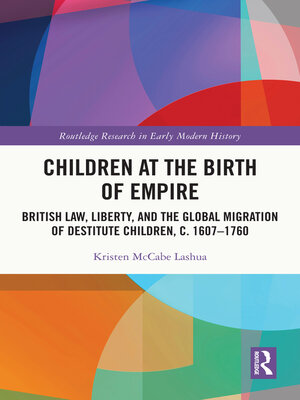Children at the Birth of Empire
ebook ∣ British Law, Liberty, and the Global Migration of Destitute Children, 1607–1760 · Routledge Research in Early Modern History
By Kristen McCabe Lashua

Sign up to save your library
With an OverDrive account, you can save your favorite libraries for at-a-glance information about availability. Find out more about OverDrive accounts.
Find this title in Libby, the library reading app by OverDrive.



Search for a digital library with this title
Title found at these libraries:
| Library Name | Distance |
|---|---|
| Loading... |
This is the first study to focus specifically on destitute children who became part of the early British Empire, uniting separate historiographies on poverty, childhood, global expansion, forced migration, bound labor, and law.
Britons used their nascent empire to employ thousands of destitute children, launching an experiment in using plantations and ships as a solution for strains on London's inadequate poor relief schemes. Starting with the settlement of Jamestown (1607) and ending with Britain's participation in the Seven Years' War (1756–1763), British children were sent all around the world. Authorities, parents, and the public fought against the men and women they called "spirits" and "kidnappers," who were reviled because they employed children in the same empire but without respecting the complexities surrounding children's legal status when it came to questions of authority, consent, and self-determination. Children mattered to Britons: protecting their liberty became emblematic of protecting the liberty of Britons as a whole. Therefore, contests over the legal means of sending children abroad helped define what it meant to be British.
This work is written for a wide audience, including scholars of early modern history, childhood, law, poverty, and empire.







